|
Click pictures for a larger version.
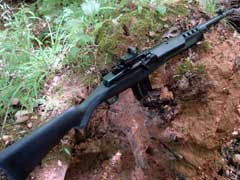
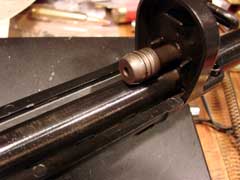
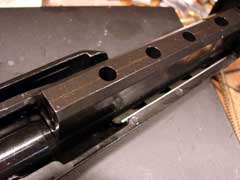
Rugged and reliable gas system.
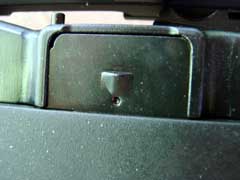
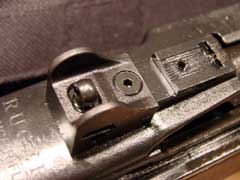
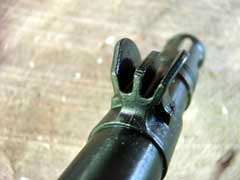
Excellent set of rugged, well-protected sights.
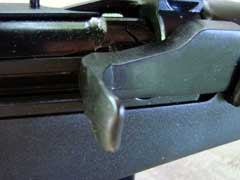
Charging handle is integral with the operating rod.
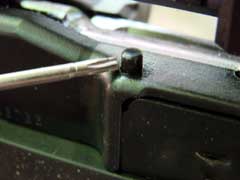
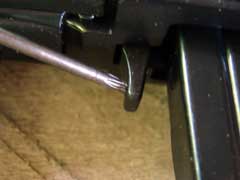
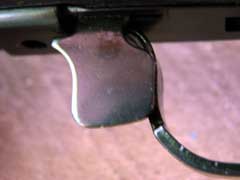
Manual bolt hold-open (top), magazine latch (center),
manual safety (bottom).
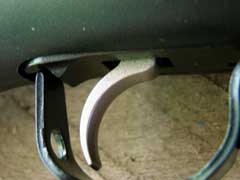
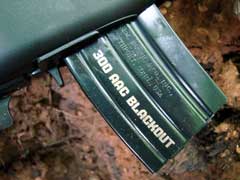
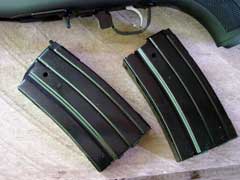
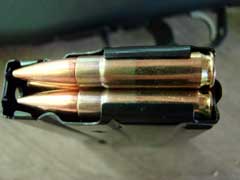
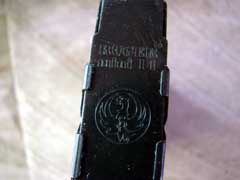
Rifle ships with two steel twenty-round magazines.
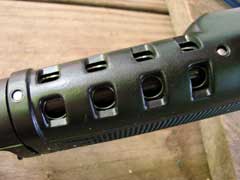
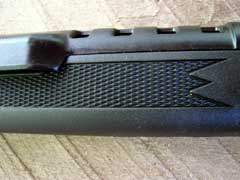
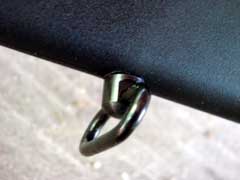
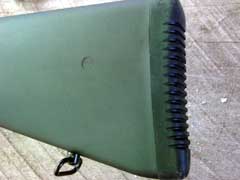
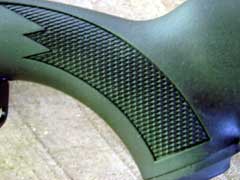
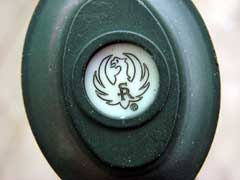
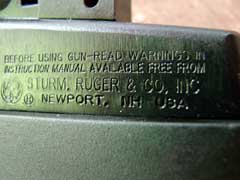
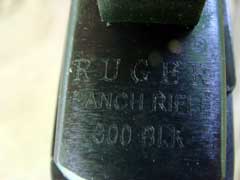
|
|
The Ruger
Mini-14 semiautomatic rifle has been on the market steadily
for just over four decades now. I have told this story before,
but it has been awhile, about my first introduction to the
Mini-14 rifle. I was just nineteen years old, working a
construction job on renovating the Kentucky State Prison at
Eddyville. We were working in an area that had us among the
prisoners, and being obsessed with anything related to firearms,
I noticed the wall guards were walking around holding carbines
at the ready. I could tell from a distance that they were not 30
M1 carbines, but I knew that I had to get a closer look at these
weapons, which I did. This was my first look at the Ruger
Mini-14, and I determined that I must own one. I have since
owned several. The design of the bolt hold-open has changed, as
well as a couple of other details, but the Mini-14 remains
basically the same as it was when introduced in 1974.
The adjectives that come to mind when
thinking back on every Mini-14 that I have owned or fired
include rugged and reliable. I have only had one Mini-14 to
malfunction on me. Back in my younger years when I played with a
couple that had been converted to run, let's say,
"faster", even those ran flawlessly. I am not saying
who did the conversion; just that they were converted. While on
that topic, Ruger also made for many years the AC-556, which is
pretty much a fully-automatic Mini-14. I think my local
Sheriff's Office still has a couple of these; one solid stock
and the other a folder, if I remember correctly. Besides the
thousands of 5.56 NATO and 223 Remington Mini-14 rifles, Ruger
also markets, and has done so for many years, the Mini-30, which
is chambered for the 7.62x39mm cartridge.
Now, Ruger has introduced the Mini-14
chambered for the increasingly-popular 300 AAC Blackout
cartridge. The 300 Blackout has ballistics that are similar to
the 7.62x39mm in its supersonic form, but the 300 is much more
efficient, and is also available in a subsonic form, which is
preferred by many for use in sound-suppressed weapons.
The 300 Blackout Mini-14 Tactical wears a
black synthetic fixed stock with molded-in checkering for a
positive grip. The stock wears a sling loop at the rear, to
match the loop attached to the front of the gas block. The
Mini-14 uses a heavy-duty, simple gas system similar to the M1
Garand and M-14 systems, and has proven to be as reliable as a
mechanical device can be. The 300 version of the Mini-14
Tactical is constructed primarily of blued alloy steel, with the
hammer and trigger being noticeably made of stainless. The
receiver wears integral scope bases to accommodate the supplied
Ruger scope rings. On that point, if your dealer tells you that
the Mini-14 does not include scope rings, and tries to charge
you extra for them, you need to find yourself an honest dealer.
Included also is a 1913 Picatinny spec optics rail, which
attaches to the top of the receiver with supplied screws. Ruger
also thoughtfully includes a wrench and thread locking compound
for the attachment of the Picatinny rail. The rear sight is an
adjustable aperture unit, mated to a rugged protected front
blade. The hammer-forged sixteen and one-eighth inch barrel has
a one-in-seven-inch right-hand rifling twist, and is fitted with
Ruger's birdcage style flash suppressor. The barrel diameter
forward of the gas block measures .75 inch diameter, and is
slightly smaller under the handguard. The Ruger Mini-14 Tactical
300 AAC Blackout weighs in at six and three-quarters pounds on
my scale, without magazine. The overall length measures 36.375
inches, with the length of pull measuring thirteen inches.
All
accuracy and velocity testing was done at an elevation of 541
feet above sea level, with temperatures in the seventy-seven
degree Fahrenheit range, with calm winds and a relative humidity
of sixty-four percent. All accuracy testing was done firing from
a solid bench using a Target Shooting,
Inc. Model 500 rifle rest. For accuracy testing, I used a
Leupold Mark 4 8.5 to 25 power scope set to the highest
magnification. The scope was attached to the Ruger's Picatinny
rail using an ArmaLite one-piece base. All ammunition was tested
for accuracy at one hundred yards. Velocities are listed in the
chart below, and were recorded ten feet from the muzzle.
Velocities are listed in feet-per-second (fps). Bullet weights
are listed in grains.
| SUBSONIC AMMUNITION |
BULLET WEIGHT |
VELOCITY with
Suppressor |
VELOCITY without
Suppressor |
| Remington OTM |
220 |
1026 |
Not Recorded |
| SUPERSONIC AMMUNITION |
BULLET WEIGHT |
VELOCITY with
Suppressor |
VELOCITY without
Suppressor |
| Remington OTM |
125 |
2253 |
2257 |
| Barnes TAC-TX |
110 |
2336 |
2314 |
| Barnes Range AR |
90 |
2687 |
2692 |
Shooting the 300 AAC Mini was uneventful, as
most every type of ammo tested ran flawlessly. The only
exception was that the 220 grain subsonic ammo would sometimes
fail to fully cycle the bolt without the can attached to the
muzzle. With the can attached, that ammo also ran flawlessly.
The trigger pull measured about 7.4 pounds of resistance on the
test rifle, but was smooth and crisp. The Mini trigger is very
easy to work on, if desired, but nothing should be done to
change the angle or the surface area of the contact points of
the sear and hammer. Just smoothing the surfaces makes a
noticeable difference, but the Mini trigger is acceptable as is
for most uses. The Mini-14 300 Blackout comes with two of the
excellent twenty-round Ruger steel magazines. The magazines are
marked "300 AAC Blackout", but they are functionally
identical and interchangeable with the 556/223 magazines. They
are marked to distinguish the ammo carried within, to prevent
the chambering of 300 AAC ammo in a 223 rifle, which can be
disastrous if fired.
Accuracy of the Mini-14 Tactical improved
greatly as the extended shooting session progressed, with the
best groups turned in near the end of the day. Rifles often
shoot better after they have had several rounds passed through
the bore, as did this Mini. Accuracy was very good with some
loads, and the better groups are pictured here. The Barnes Range
AR ammo did not perform well in this rifle, regarding accuracy,
but it is built and marketed as practice ammo. The premium
Barnes TTSX is my favorite load in 300 Blackout, for all serious
purposes, such as hunting and resolving distasteful social
conflicts. The TTSX bullet performs perfectly, expanding and
penetrating every time. After the accuracy testing, I removed
the big Leupold and mounted a Redfield Accelerator electronic
dot scope atop the rail for some fun plinking out to 100 yards.
The Redfield weighs almost nothing, and is an excellent choice
for this rifle for close range work.
The Ruger Mini-14 300 Blackout rifle is
available now, with a suggested retail price of $1019 US as of
the date of this review, but on "Gallery
of Guns" I was able to find them in stock and ready to
ship for about $250 less. Again, that is as of the date of this
review. Prices and availability of any weapon could change
overnight. Like all Ruger firearms, the Mini-14 Tactical is
built in the USA.
Check out the Ruger Mini-14 and other Ruger
products online at www.ruger.com.
For the location of a Ruger dealer near you,
click on the DEALER FINDER at www.lipseys.com.
To order the Ruger Mini-14 online, click on
the Gun Genie at www.galleryofguns.com.
For a closer look at the extensive line of
Redfield optics , go to www.redfield.com.
To order quality 300 Blackout ammunition, go
to www.midsouthshooterssupply.com,
www.doubletapammo.com,
and www.luckygunner.com
For
Mini-14 magazines and accessories, go to www.shopruger.com.
Jeff Quinn
  
Got something to say about this article?
Want to agree (or disagree) with it? Click the following link to
go to the GUNBlast Feedback Page.
|
|
Click pictures for a larger version.
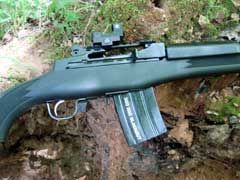
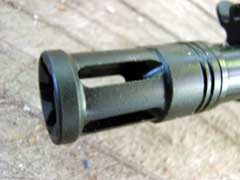
Birdcage flash suppressor.
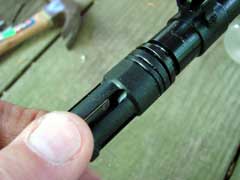
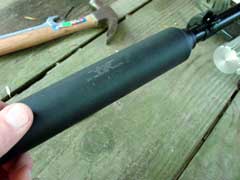
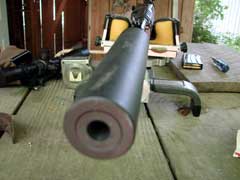
Tactical
Solutions sound suppressor.
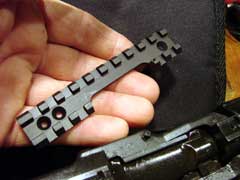
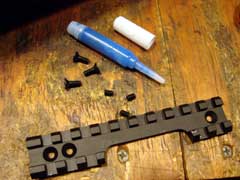
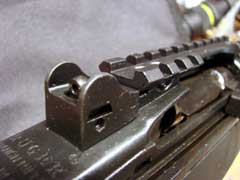
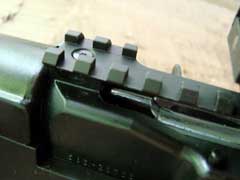
1913-spec Picatinny rail is included.
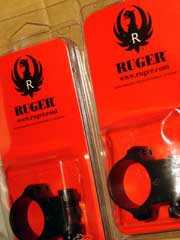
Sturdy Ruger scope rings are included with the rifle.
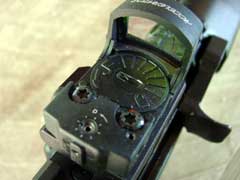
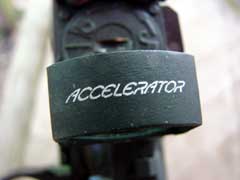
Redfield Accelerator electronic dot sight.
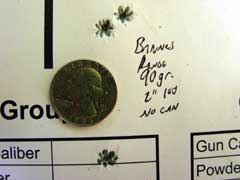
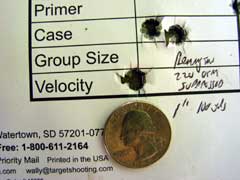
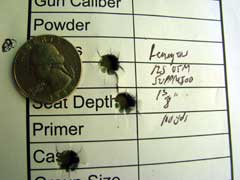
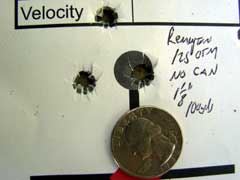
Some of the better groups fired at 100 yards.
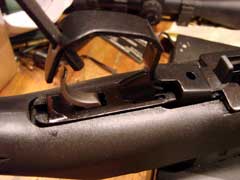
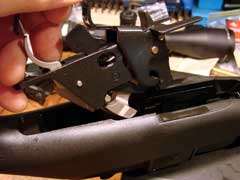
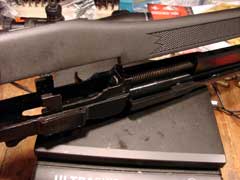
Disassembly is quick and easy.
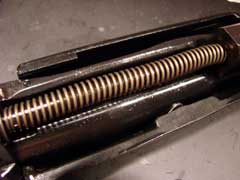
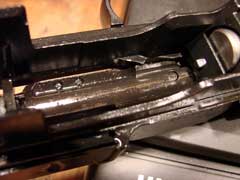
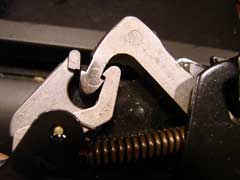
This picture shows the relationship of the primary
and secondary sears to the hammer.
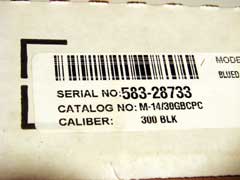
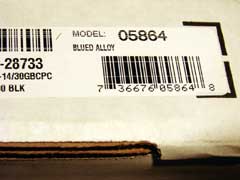
|
![]()